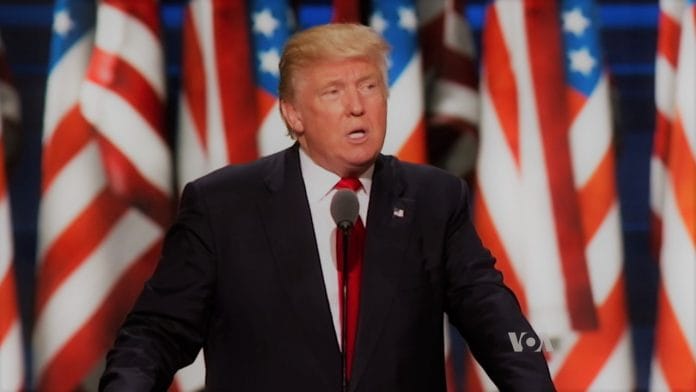Weeks after US President Donald Trump admonished Pakistan for providing safe havens for terror, he tweeted on 13 October that he is “starting to develop a much better relationship with Pakistan and its leaders”. This came a day after Pakistani forces rescued an American-Canadian family which was abducted by the Haqqani terror network. Trump said the release was a “positive moment” for US relations with Pakistan.
Is there a real thaw between Trump and Pakistan, or does his tweet highlight the transactional nature of his foreign policy? We ask experts from India, Pakistan and the US.
Trump foreign policy strategy shows a familiar pattern: harsh rhetoric, escalation of tension, and then claiming success over some gesture or action
 Arun K. Singh
Arun K. Singh
Former ambassador to the United States.
In his 21 August speech, referring to Pakistan while outlining his Administration’s new strategy for Afghanistan, President Trump had said that “no partnership can survive a country’s harbouring of militants and terrorists”. Since the new administration took over in January this year, it had been put out that this time, the US approach would be different, that there was frustration with Pakistan’s continued support for terrorist groups even as it received billions of dollars of US assistance, and that pressure on or action against Pakistan would be enhanced.
In the TalkPoint on 19 July, I had said that “Pakistan will buy time by providing some specific cooperation and look for constituencies in US intelligence and military who would argue that it is too necessary a partner to break with”.
This is what Pakistan has done repeatedly in the past whenever it found US frustration reaching a boiling point. This time too, Pakistan got the Haqqani network, which Admiral Mullen had described in 2010 as a strategic arm of the ISI, to release a Canadian- American hostage family. This led the US to claim success, and President Trump to claim in a tweet that he was “starting to develop a much better relationship with Pakistan and its leaders”.
Trump’s foreign policy strategy has shown a pattern of harsh rhetoric, escalation of tension, and then claiming success, whether real or not, over some gesture or action. Some of his comments on China’s approach to North Korea have followed this pattern. The hope clearly is to get some action, by generating uncertainty, and then claim victory for himself and his approach.
With Pakistan, therefore, one should expect a volatile cycle of praise, criticism, inducement, threat of action, and occasional penalties, but never sufficient to meet India’s expectation or induce a long term reorientation in behaviour.
No, the US-Pakistan relationship hasn’t been reset
 Michael Kugelman
Michael Kugelman
Deputy director, Asia Program, The Wilson Center
On Friday the 13th, Donald Trump tweeted supportive words about US-Pakistan relations. “Starting to develop a much better relationship with Pakistan and its leaders,” he proclaimed. It was an auspicious moment for the troubled US-Pakistan relationship on an otherwise inauspicious day.
But let’s not get ahead of ourselves. The US-Pakistan relationship is still in crisis, and the road to rapprochement will be long and hard.
Trump’s tweet was prompted by Pakistan’s assistance in the release of a family held captive by the Taliban. One family member, Caitlin Coleman, is a US citizen.
Pakistan’s cooperation infuses some goodwill into a relationship long on tensions and short on trust — particularly since Trump announced his Afghanistan strategy, which calls for India to increase its role in Afghanistan.
And yet, Islamabad’s goodwill gesture didn’t address Washington’s underlying demand of Pakistan: The elimination of sanctuaries on Pakistani soil for terrorists that threaten and target Americans in Afghanistan.
For the Trump administration, which accords top priority to combating terrorism that threatens Americans, the sanctuary issue will dominate relations with Islamabad. Until Pakistan addresses it, the relationship is unlikely to improve in a big way.
Alas, we shouldn’t hold our breath that Pakistan will be smashing sanctuaries anytime soon, given its entrenched interest in maintaining ties to those sheltered by the state.
Look no further than Hafiz Saeed.
On Sunday, Pakistan dropped terrorism charges against Saeed — paving the way for the possible release from house arrest of someone that America would much prefer to see behind bars.
Is the United States once more interpreting a stand-alone event as evidence of change in Rawalpindi?
 Alyssa Ayres
Alyssa Ayres
Senior Fellow for South Asia, Council on Foreign Relations
President Donald Trump’s tweet praising Pakistan, following the rescue of a family held hostage for five years by the Haqqani Network, has raised questions (acutely so in India) about whether Washington is falling for the same old trick once again. Is the United States once more interpreting a stand-alone event as evidence of change in Rawalpindi? In this case, it was a hostage rescue; in the past, just prior to a high-level US official visit, there would be the sporadic capture of an al-Qaeda “number three” type.
It’s just too much overinterpretation to read into 140 characters the idea that the United States is ready to soften its clearly-declared approach to terrorism in Pakistan, and proclaim a permanent thaw. This is an isolated incident, certainly a positive signal, but not sufficient to make any more sweeping conclusions about either Pakistan’s orientation to counterterrorism, nor the US approach to Pakistan.
Following the rescue, not expressing appreciation for welcome cooperation and assistance would have been a mistake. But does the tweet of praise mean anything more? We will have to see how much effort Pakistan puts into countering the Haqqani Network as well as various India-focussed and no less lethal groups like the Lashkar-e-Taiba and Jaish-e-Muhammad. I find it hard to believe that after placing terrorism at the top of the priority list with Pakistan, one single positive action will erase the compendium of long-overdue steps anyone would seek from Pakistan.
The systemic and strategist mistrust that remains between Islamabad and Washington will persist
 Ankit Panda
Ankit Panda
Senior editor, The Diplomat
With one tweet, US President Donald J. Trump has shown just how quickly the pendulum can swing in the love-hate US-Pakistan relationship. After lambasting Islamabad in his major speech on Afghanistan strategy, Trump noted that the United States was “[s]tarting to develop a much better relationship with Pakistan and its leaders”. He continued and thanked Pakistan for its cooperation “on many fronts”.
One of those fronts, no doubt, was the recent operation conducted by Pakistani forces, based on actionable US intelligence, to rescue Caitlan Coleman and Joshua Boyle, a Canadian-American couple who’d spent five years in militant captivity.
Details around the operation remain hazy, but several observers of the US-Pakistan relationship were quick to point out that the operation coincided with a visit to Pakistan by US National Security Council South Asia Senior Director Lisa Curtis and Assistant Secretary of State for South Asia Alice Wells.
For skeptics and cynics, long jaded by Pakistan’s good-cop-bad-cop routine with the United States, the operation appeared to have been a calculated step to win over Trump with an abashedly positive deliverable.
The Pakistani military released a statement noting that the operation “underscores the importance of timely intelligence sharing and Pakistan’s continued commitment” to counterterrorism efforts. One operation demonstrating that Pakistan’s military can serve as a useful partner might result in a presidential tweet of approval, but it is unlikely to produce a systemic shift in the Trump administration’s already-stated views on Pakistan’s tolerance for militants on its soil and its role across the Durand Line in Afghanistan. Too often have opinions been formed on the state of the US-Pakistan relationship on tactical matters. The systemic and strategist mistrust that remains between Islamabad and Washington will persist.
A self-confident nation should be least bothered about what Trump says in his tweets
 Harsh V. Pant
Harsh V. Pant
Professor of International Relations, King’s College London
US President Donald Trump’s favourable tweet on Pakistan has led to several more tweets in India asking if this heralds a change in the Trump administration’s initial tough attitude towards Islamabad.
This brouhaha over a tweet says more about us as a nation than anything significant about America’s South Asia policy. We remain so obsessed with Pakistan that we fail to comprehend how India’s salience has increased in American foreign policy calculus. The Trump administration’s recently unveiled South Asia policy has made a strong case of India’s centrality in South Asia. India has been exceptionally successful in highlighting Pakistan’s role in nurturing terrorism in recent years and this too was reflected in the new regional policy of the Trump administration.
Yet, New Delhi’s policy community wants to vet every action of a mercurial Trump. The famous Trump phone call to then Pakistani Prime Minister Nawaz Sharif last year in December, during which he apparently agreed to visit Pakistan and said he was “ready and willing to play any role that you want me to play to address and find solutions to the outstanding problems” is now readily forgotten. This was a call which too had raised hackles in sections of the New Delhi elite. It was Prime Minister Narendra Modi’s visit to the US which brought some normalcy in the discourse, followed by the announcement of the new South Asia strategy.
But a tweet aimed more at Trump’s domestic audience is once again generating needless apprehension in India. A self-confident nation should be least bothered about what Trump says in his tweets. Trump’s tough words on Pakistan will not marginalise Pakistan, and his tentative appreciation of Islamabad’s counter-terror efforts will not make US-Pakistan relationship strategic in orientation.
With or without Trump, transactional nature of Pak-US relationship will continue
 Raza Ahmad Rumi
Raza Ahmad Rumi
Editor, Daily Times, visiting faculty at Cornell University and Ithaca College.
Pakistani policy-makers and analysts were surprised by the US President Trump’s tweet appreciating Pakistan’s ongoing cooperation in fight against terrorism. Trump, who employs Twitter for official announcements, used a different tone for Pakistan in sharp contrast to his provocative speech on South Asia policy in August 2017. The recent compliment came after a successful collaboration between Pakistan and American security apparatuses that led to the release of Western hostages held by Taliban.
However, this is not surprising. Washington and Islamabad have perfected the art of managing a transactional relationship. Since Trump’s August speech, Pakistan had strongly reacted by not only cancelling visits of US officials, but also making it clear that it was no longer dependent on Washington for the usual goodies. Since then, public and backdoor diplomatic engagement has been underway to repair a strained relationship.
Trump might have been advised to make a public acknowledgment of Pakistan military’s role in freeing the Canadian-American family. This development also takes place as the quadrilateral peace talks on Afghanistan start in Muscat on Monday. The US is hoping that the talks might make some headway. If the talks are not productive as per American expectations, the US administration and Trump are likely to reverse course and criticise Pakistan. This is how the transactional relationship works. With or without Trump, the transactional nature of this relationship will continue.
Yet, Trump’s praise for Pakistan is an opportunity for the civilian and military policy makers in Islamabad to capitalise on the goodwill, and find ways to repair a decades-old relationship. The reality is that both sides cannot afford things to get worse, given the unending and seemingly intractable conflict in Afghanistan.
America needs logistics support from Pakistan for its Afghanistan strategy
 Vijay Chauthaiwale
Vijay Chauthaiwale
In-charge, foreign affairs department, BJP
President Trump’s tweet about Pakistan comes against the backdrop of the rescue of an American woman and her family from the Haqqani network by the Pakistani army. It is equally true that America needs logistics support from Pakistan for its Afghanistan strategy.
As American foreign policy under Trump is largely transactional, this tweet is not a surprise. Very recently, America and its close NATO allies like UK, Germany and France have taken dramatically opposite positions on the Iran nuclear deal. This exemplifies that even the closest friends can have differing views on specific issues. It, therefore, does not adversely affect growing the cooperation between India and America, which is reflected in the statements of various American policymakers.
In spite of this specific tweet, the fact remains that the American President and his senior-most colleagues have criticised Pakistan for its support to terrorism. The same is also reflected in Congressional hearings. Next month, Ivanka Trump will be visiting India for the Global Entrepreneurs Summit in Hyderabad. All this indicate strengthening ties and convergence of minds between India and America.
As far as Rahul Gandhi’s response to Trump’s tweet is concerned, it only shows (again) his immaturity and lack of understanding of geopolitics, in spite of a record number of foreign trips.
His tweet does not suggest a carefully thought-through shift in strategic direction
 Paul Staniland
Paul Staniland
Co-director, Program on International Security Policy, University of Chicago.
Donald Trump has few fixed opinions on foreign policy, beyond a generalised distaste for most foreign countries, and disinterest in being constrained by agreements or precedents. His word is unreliable and should not guide policymakers or citizens abroad. His earlier embrace of India – which led to much excited commentary in India and the US – was not driven by his own clear strategic calculations or commitments. Countries that can put on a show for Trump or flatter him may attract his transient favour, but he lacks consistency and follow-through.
His tweet about Pakistan similarly does not suggest a carefully thought-through shift in strategic direction. Pakistan was able to deliver something useful to Trump, and his response was to give it a rhetorical reward. In of itself, the tweet is meaningless. But it does suggest that Indians should not put any faith in Trump as a person – his combination of ignorance and mercurialness is no basis for an enduring strategic relationship.
Trump is not even competently transactional, since no one should have any faith in his ability to either deliver major benefits or impose real costs. Few deals of any significance have emerged since his inauguration, at home or globally.
Instead, the key American drivers of the US-India relationship will be the American defence and diplomatic establishments, the business community, and the Indian-American diaspora. These are the actors that will underpin US-Indian ties over the medium- to long-term. They are worth far more attention than Trump’s latest internet tantrum.
Trump administration wants to argue that US pressure on Pakistan is translating into tangible outcomes
 Andrew Small
Andrew Small
Senior Transatlantic Fellow, The German Marshall Fund of the United States
In the immediate aftermath of President Trump’s August speech announcing the new US strategy for South Asia, Pakistan reacted indignantly. It appeared there was a real prospect of US-Pakistan relations heading into a deep freeze.
Yet since then, the Pakistanis have acted fairly pragmatically, trying to figure out what steps they can take to keep ties with Washington on track without shifting the fundamentals of their approach. We’ve recently seen Bajwa’s visit to Afghanistan, the resumption of the Quadrilateral Coordination Group on Afghan peace talks, and then the hostage rescue last week. These are partly intended as demonstrations of goodwill but also of the benefits that Washington can still expect if there isn’t a more serious bilateral rift.
As long as Pakistan delivers results as concrete as the release of American hostages, they will be credited accordingly, and the Trump administration certainly wants to be able to argue that US pressure is translating into tangible outcomes. But the single biggest area where Washington wants to see progress is on safe havens and – unless Pakistan can kick-start a credible peace process with the Taliban – that will do more to condition the relationship in the coming years than anything else.
The mood on Pakistan in Washington is still highly sceptical and the President’s statement doesn’t reflect any deeper change of views in that regard. There is a window now, though, in which the US wants to see how Pakistan responds to the new strategy and is happy to take whatever wins it gets in the short-term, even if the medium-term outlook is bleaker.
It is rare for President Donald Trump to praise anyone except himself
 Rahimullah Yusufzai
Rahimullah Yusufzai
Resident Editor, The News International, Peshawar and Correspondent BBC World Service
It was a pleasant surprise to hear him compliment Pakistan for rescuing the kidnapped Canadian-American family in a military action in Kurram Agency in Pakistan’s Federally Administered Tribal Areas (Fata) on the basis of information provided by the US intelligence agencies while being shifted there from Afghanistan.
However, Trump’s praise for Pakistan was half-hearted and clearly insincere as prior to his public statement he had proudly told a gathering of his supporters that a country which didn’t respect the US until recently was doing so now because of his tough policies. The reference was clearly to Pakistan as he was mentioning the recovery of the American woman, Caitlan Coleman, and her Canadian husband, Joshua Boyle, and their three children born during their five-year captivity in the hands of the Haqqani network.
Though the incident carried the promise of creating a thaw in the frosty US relations with Pakistan, it could be brief and uncertain given their different viewpoints and agendas concerning the situation in Afghanistan and the region. There has been no change in Trump’s policy made public in his August 21 speech in which he publicly criticised Pakistan for harbouring terrorists attacking US and Afghan forces in Afghanistan and warning it had much to lose if it didn’t change track and a lot to gain if it did.
It is obvious that Trump believes in using coercive methods to bring Pakistan, or for that matter other countries, to do America’s bidding. Though Pakistan emphasised the point that intelligence-sharing and cooperation with the US as witnessed during the recovery of the Canadian-American family was the right way to tackle terrorists, it is debatable if the same sentiment prevails in the Trump White House. Trump’s foreign policy regarding Pakistan is transactional in nature and it will be dictated by his administration’s objectives requiring Islamabad to cooperate in stabilising Afghanistan on US terms or face the consequences. As Trump wants to score a military victory against the Taliban in Afghanistan after failing to do so in the last 16 years despite deploying a much bigger force, his demands on Pakistan to do more would continue and Islamabad would be blamed the most for the likely failure in accomplishing the mission.






